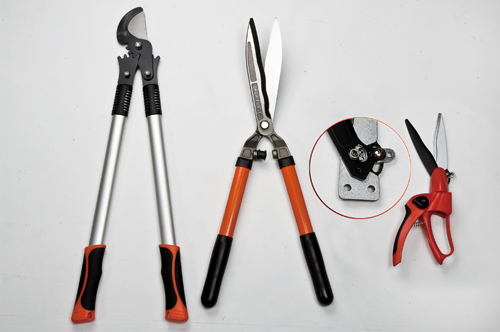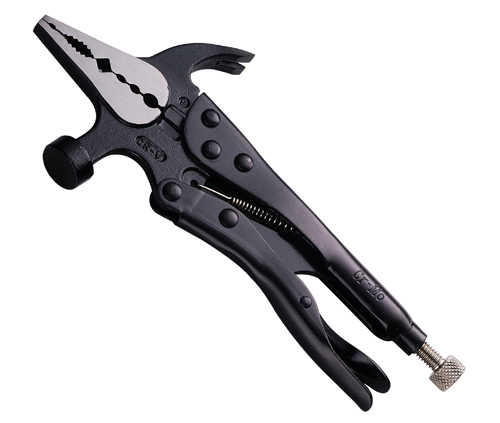Taiwan’s Hand Tool Makers Share Notes on Doing Business in China
2011/02/24 | By Steve ChuangAs China’s GDP surged 10.3% to US$6.04 trillion to outpace Japan (US$5.4 trillion) as the world’s second-largest economy in 2010, few now question the country as one of the fastest markets globally, also seen as an opportunity for Taiwanese hand tool makers to promote own-brand products for sustainable development.
The new chairman of the Taiwan Hand Tool Manufacturers’ Association (THTMA), Mark Lin, said in an interview with CENS, “Taiwanese hand tool makers’ opportunities for moving upmarket to OBM (original brand manufacturing) are there,” primarily for being able to offer products that are reliable, competitively priced and also due to shared historical, cultural, ethnic and linguistic ties.
Besides, the ECFA (Economic Cooperation Framework Agreement) allows zero duty status by 2012 for the export of six Taiwan-made hand tools, such as pliers, wrenches, hammers and screwdrivers, on the so-called Fast-track Gainers List, as well as over 500 others, which are more accessible to the Chinese market.
But the China market is simply too enormous to generalize as a bounty, for its size makes it risky and difficult for Taiwanese hand tool makers to explore independently. In many cases, they ultimately flounder to succeed in OBM there due to unfamiliarity with the market and consumers, lack of useful information and assistance from trustworthy local partners, despite sharing the language. Plus, many other competitors are also vying for the same, potentially lucrative opportunity.
A few Taiwanese suppliers, backed by real-world business experience in China, share strategies and ideas in an interview with CENS.
Wise Center
After over two years of promoting own-brand garden shears and tools in China, Thomas Lin, president of Wise Center Industrial Group Inc., sums up the importance of market research and support from reliable, professional partners.
Wise Center, a prestigious garden tool supplier founded in 1991 in Taiwan’s central city of Taichung with numerous years of experience in OEM (original equipment manufacturing) and ODM (original design manufacturing), offers mainly three product lines, namely garden shears, hand tools sets and ladders, and pruners, most of which go to Europe and the U.S.
Branding Strategy
The company has four distributors and retailers promoting its own-brand garden tools in Wuhan City, Hebei Province and Tianjin City, the three northeastern provinces and southern regions.
Like most Taiwanese hand tool manufacturers, Wise Center is a small enterprise with limited resources for branding, says Lin. To achieve maximum performance and market segmentation, the maker decided to launch two different brands, one for DIY garden tools and the other for top-end products initially.
Lin says that years of research inspired his company to come up with the strategy, which has proven successful so far. The company has effectively built recognition among consumers with DIY tools in central and southern China, also building higher profile than competitors with top-end professional models in the north and northeast.
“We found that demand in a certain region is high due to climate and crop growing. As most cash crop and fruit in China are grown in cold weather, farmers need professional tools, and therefore we promote higher-end garden tools in the north and northeast under the own brand Chienchia, and DIY tools under the other brand in the central and south,” says Lin.
Reliable Partners
To minimize operating risk and succeed also hinge on having trustworthy, professional partners. So far, only five to six Taiwanese manufacturers are faring well in the market for partnering with quality distributors to promote products, stresses Lin.
To promote its high-end, high priced pruners, Lin says that his company luckily found a conscientious distributor in Xian City, eastern China, who sent agricultural technicians to educate local farmers on the necessity of using high-quality tools to protect cash crops, thus creating a number of loyal users for Wise Center’s pruners.
The distributor, familiar with the local market and how to convince users effectively, as well as a semiofficial organization promoting agricultural know-how, demonstrated the pruners based on trust in Wise Center’s products, says Lin.
Brighter Outlook
Based on observations and experience, Lin is also more optimistic about the Chinese market for garden and professional hand tools and power tools. In fact, China’s thriving real estate market helped offset Lin’s falling 2009 sales in Europe, as construction of more luxury condos with gardens created strong demand for professional garden tools.
High-end, efficient tools will be increasingly needed in China due partly to strong economic growth and partly to China’s one-child policy, spoiling children who dislike physical labor. Plus demand for high-efficiency, effort-saving tools will surge due to worsening labor shortages in gardening and related sectors.
Meanwhile, the Chinese government is actively promoting power-driven agricultural tools in rural regions, which will also drive the local segment for electrical garden tools, says Lin, who reveals that a full line of such products are being developed in the company’s R&D department in Taiwan.
Ferro-Carbon
Unlike in the U.S. and Europe, widely used DIY and professional tile cutters and tools are not popular among Chinese consumers, so Ferro-Carbon Enterprise Co., Ltd. turned to promotion of middle-to-high-end suction cups, hence carving out its niche in China.
The company started out in 1989 in Taichung City mainly as an OEM of tile cutters and accessories, and expanded into tiling and carpeting tools as tungsten-carbide wheels, universal drill guide sets and diamond hole saws, grout saws and tile files, suction cups, PVC (polyvinyl carbonate) trims and cutters, knee pads, and pliers and scissors a few years later.
Few in the line can compare with the company in branding, as the general manager, May Lin, has adopted effective management systems and quality control measures to improve operation efficiency and build a world-caliber brand since 1991, when the company debuted its Tile Craft-branded tools, successfully impressing buyers at the International Hardware Fair Cologne.
Knowing the difficulty in branding to a traditional manufacturer and benefits it brings to sustainable development, Lin says the company has painstakingly focused on R&D, quality improvement, packaging design, product differentiation and value creation, to build a positive brand image. The effort has paid off, as the company leads the suction cup sector with the own brand FECA.
Suction Cups
“We decided to explore the Chinese market one year ago with suction cups for we found tile cutters unpopular with local consumers due to user experience. The decision is proving fruitful for FECA suction cups, featuring innovative double-lock mechanism and unparalleled adhesion, are incredibly popular with Chinese consumers,” says Lin, adding that the double-lock suction cups also were hot-sellers in Japan in 2008.
Perfecting the suction cups based on user feedback also helps to create popular products, which has been the key sales driver over the past few years in China, after only one year of promotion.
Branding Strategy
Another key factor behind the success of FECA-branded suction cup in China is the brand positioning and value proposition. The products stand out amid numerous competitors in the market by being promoted with the Made-in-Taiwan concept, quality and packaging to attract consumers, according to Lin.
“We position FECA as Taiwan-made, higher-end suction cups, differentiating it from rivals with unmatchable quality and premium packaging, so consumers are willing to pay more. Taiwanese companies aiming to compete in China should figure out their distinct advantages, tapping such merits to differ from competitors,” says Lin.
The company’s suction cup sales in China is expected to rocket to contribute 30% of the total this year, with Lin confirming that the company has added a new distributor in Harbin City, northeastern China. She is very optimistic that FECA suction cups will be a hot-seller in the frigid city, for the product has better weather resistance than most rivals and is the world’s only one to features good adhesion to frosted glass.
Latecomer
While quite a few Taiwanese hand tool companies are knee-deep in the Chinese market, some are just getting their feet wet mainly due to lingering worries over copycatting that is notorious among Chinese manufacturers. One maker that has hesitated for years is Mightjaw Tools Co., Ltd., a specialized plier maker established in 1983 in Taichung City.
“We decided to set aside our apprehension, considering China is actually the opportunity for Taiwanese hand tool makers to develop own brands,” says Ellick Shih, sales representative in charge of promotion in China, which has just begun this year.
Key Advantage
Initially the company will start promoting pliers and multifunctional pliers made of high-grade chrome vanadium steel and chrome molybdenum steel to highlight its competitiveness over local competitors. “We find that local makers are inferior in finishing pliers of such materials, which is our chance to break into the market. In addition, the company will also be committed to consumer service to differentiate from competitors,” says Shih.
Meanwhile, the company may also seek help from the THTMA. The cooperation between the THTMA and its Chinese counterparts, like the China National Hardware Association and All-China Federation of Industry & Commerce, helps most Taiwanese hand tool makers lacking resources, says Shih.
THTMA chairman Lin promotes such cooperation to facilitate information sharing and periodic Cross-Strait meetings to help reduce operating risks for Taiwanese companies, also allowing Taiwanese makers to take advantage of these associations’ nationwide distribution channels to speed market access.
While many of its peers have jumped into the China market, Shih stresses that the company won’t rush, but try to make a solid start by debuting Mightyjaw-branded pliers at the China International Hardware Show to be held March 9 to 11 in Shanghai, to look for trustworthy distributors and agents. The company’s cautious and measured approach is shared by many Taiwanese hand tool manufacturers, perhaps a competitive edge in this industry for decades.
| Output of Taiwan’s Hand Tool Industry | |||||||
| 2007 | 2008 | 2009 | Q3, 2010 | 2010 | |||
| Value | Value | Value | Value | Y-on-Y Growth | Value | Y-on-Y Growth | |
| Output | 59.04 | 59.45 | 46.34 | 15.97 | 30.9% | 56.00 | 20.8% |
| Export | 51.95 | 55.89 | 42.96 | 15.15 | 38.7% | 53.00 | 25.4% |
| Import | 3.88 | 4.29 | 2.81 | 1.25 | 62.9% | 4.25 | 51.2% |
Source: Metal Industries Research & Development Center

